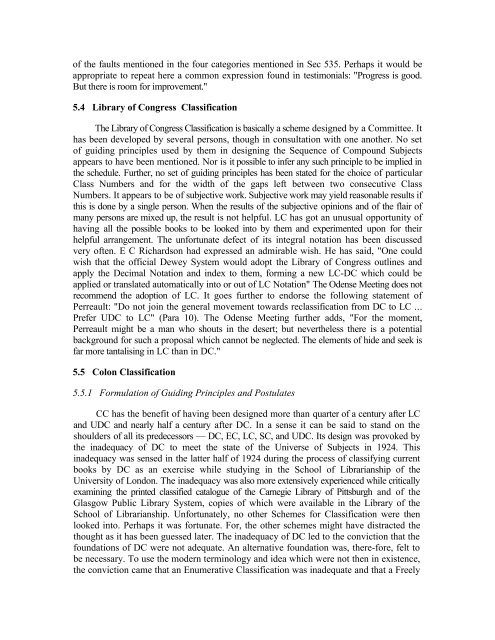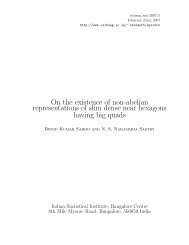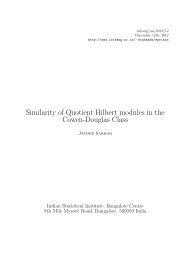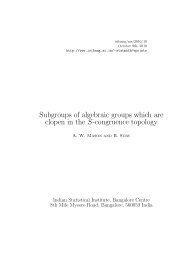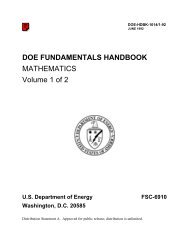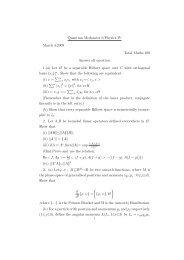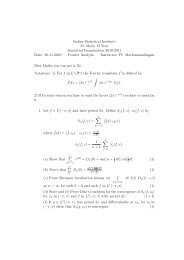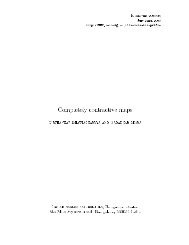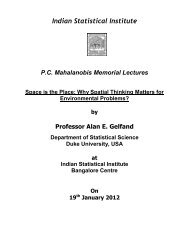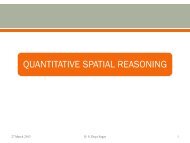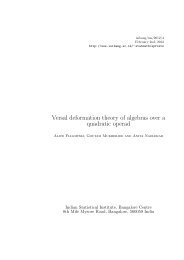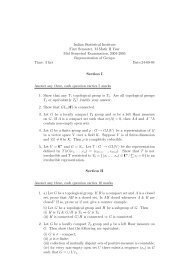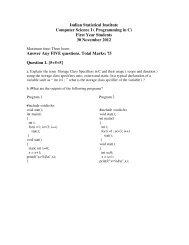CHOICE OF SCHEME FOR CLASSIFICATION - Indian Statistical ...
CHOICE OF SCHEME FOR CLASSIFICATION - Indian Statistical ...
CHOICE OF SCHEME FOR CLASSIFICATION - Indian Statistical ...
You also want an ePaper? Increase the reach of your titles
YUMPU automatically turns print PDFs into web optimized ePapers that Google loves.
of the faults mentioned in the four categories mentioned in Sec 535. Perhaps it would be<br />
appropriate to repeat here a common expression found in testimonials: "Progress is good.<br />
But there is room for improvement."<br />
5.4 Library of Congress Classification<br />
The Library of Congress Classification is basically a scheme designed by a Committee. It<br />
has been developed by several persons, though in consultation with one another. No set<br />
of guiding principles used by them in designing the Sequence of Compound Subjects<br />
appears to have been mentioned. Nor is it possible to infer any such principle to be implied in<br />
the schedule. Further, no set of guiding principles has been stated for the choice of particular<br />
Class Numbers and for the width of the gaps left between two consecutive Class<br />
Numbers. It appears to be of subjective work. Subjective work may yield reasonable results if<br />
this is done by a single person. When the results of the subjective opinions and of the flair of<br />
many persons are mixed up, the result is not helpful. LC has got an unusual opportunity of<br />
having all the possible books to be looked into by them and experimented upon for their<br />
helpful arrangement. The unfortunate defect of its integral notation has been discussed<br />
very often. E C Richardson had expressed an admirable wish. He has said, "One could<br />
wish that the official Dewey System would adopt the Library of Congress outlines and<br />
apply the Decimal Notation and index to them, forming a new LC-DC which could be<br />
applied or translated automatically into or out of LC Notation" The Odense Meeting does not<br />
recommend the adoption of LC. It goes further to endorse the following statement of<br />
Perreault: "Do not join the general movement towards reclassification from DC to LC ...<br />
Prefer UDC to LC" (Para 10). The Odense Meeting further adds, "For the moment,<br />
Perreault might be a man who shouts in the desert; but nevertheless there is a potential<br />
background for such a proposal which cannot be neglected. The elements of hide and seek is<br />
far more tantalising in LC than in DC."<br />
5.5 Colon Classification<br />
5.5.1 Formulation of Guiding Principles and Postulates<br />
CC has the benefit of having been designed more than quarter of a century after LC<br />
and UDC and nearly half a century after DC. In a sense it can be said to stand on the<br />
shoulders of all its predecessors — DC, EC, LC, SC, and UDC. Its design was provoked by<br />
the inadequacy of DC to meet the state of the Universe of Subjects in 1924. This<br />
inadequacy was sensed in the latter half of 1924 during the process of classifying current<br />
books by DC as an exercise while studying in the School of Librarianship of the<br />
University of London. The inadequacy was also more extensively experienced while critically<br />
examining the printed classified catalogue of the Carnegie Library of Pittsburgh and of the<br />
Glasgow Public Library System, copies of which were available in the Library of the<br />
School of Librarianship. Unfortunately, no other Schemes for Classification were then<br />
looked into. Perhaps it was fortunate. For, the other schemes might have distracted the<br />
thought as it has been guessed later. The inadequacy of DC led to the conviction that the<br />
foundations of DC were not adequate. An alternative foundation was, there-fore, felt to<br />
be necessary. To use the modern terminology and idea which were not then in existence,<br />
the conviction came that an Enumerative Classification was inadequate and that a Freely


